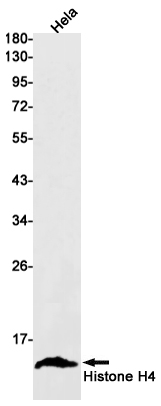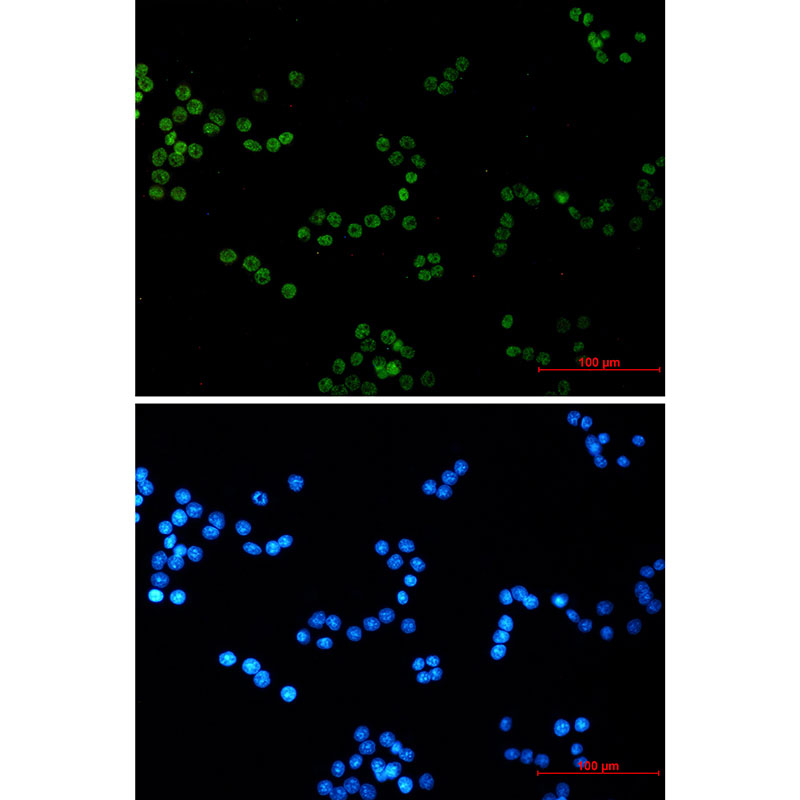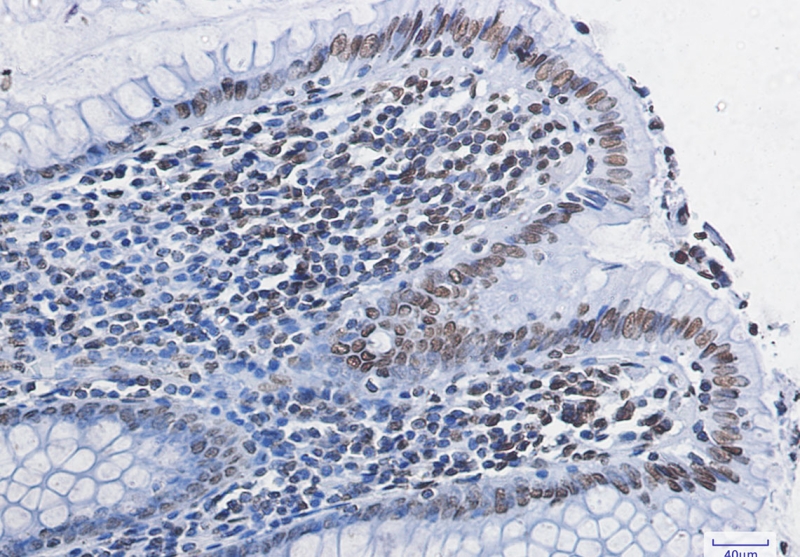


| WB | 1/500-1/1000 | Human,Mouse,Rat |
| IF | 咨询技术 | Human,Mouse,Rat |
| IHC | 1/50-1/100 | Human,Mouse,Rat |
| ICC | 1/50-1/200 | Human,Mouse,Rat |
| FCM | 咨询技术 | Human,Mouse,Rat |
| Elisa | 咨询技术 | Human,Mouse,Rat |
| Aliases | Histone H4 |
| Entrez GeneID | 121504 |
| WB Predicted band size | Calculated MW: 11 kDa; Observed MW: 11 kDa |
| Host/Isotype | Rabbit IgG |
| Antibody Type | Primary antibody |
| Storage | Store at 4°C short term. Aliquot and store at -20°C long term. Avoid freeze/thaw cycles. |
| Species Reactivity | Human |
| Immunogen | A synthetic peptide of human Histone H4 |
| Formulation | Purified antibody in TBS with 0.05% sodium azide,0.05%BSA and 50% glycerol. |
+ +
以下是3篇关于Histone H4抗体的参考文献,包含文献名称、作者及摘要概括:
---
1. **文献名称**: "Specific antibodies against acetylated histone H4: A novel tool for chromatin research"
**作者**: Turner, B.M., et al.
**摘要**: 该研究报道了一种针对乙酰化组蛋白H4(H4K16ac)的特异性抗体的开发与验证。作者通过免疫印迹(Western blot)和免疫荧光技术证实了抗体在识别哺乳动物细胞染色质乙酰化修饰中的高特异性,并应用于表观遗传学调控机制的研究。
---
2. **文献名称**: "Antibody-based profiling of histone modifications in cancer cell lines"
**作者**: Lin, Y., et al.
**摘要**: 本研究系统性评估了多种组蛋白修饰抗体(包括Histone H4的甲基化与乙酰化形式)在癌细胞系中的特异性。通过ChIP-seq和质谱分析,验证了H4K20me3抗体在DNA损伤修复研究中的应用价值,并提供了抗体交叉反应性的重要数据。
---
3. **文献名称**: "Chromatin immunoprecipitation using histone H4 antibodies reveals dynamic epigenetic changes during cell differentiation"
**作者**: Smith, C.M., et al.
**摘要**: 利用Histone H4抗体进行染色质免疫沉淀(ChIP),研究团队揭示了干细胞分化过程中组蛋白H4全局修饰的动态变化,发现H4去乙酰化与基因沉默显著相关,为表观遗传调控分化提供了新见解。
---
**备注**:以上文献信息为示例性质,实际引用时建议通过PubMed或Google Scholar以关键词“Histone H4 antibody”、“histone modification ChIP”等检索最新或领域内高引论文,并核对作者及摘要准确性。
Histone H4 antibodies are essential tools in epigenetics and chromatin biology research, targeting one of the five major histone proteins critical for nucleosome assembly and DNA packaging. Histone H4. a core component of the nucleosome, forms an octamer with two copies each of H2A, H2B, H3. and H4. around which DNA is wrapped. This structural role is vital for chromatin compaction and genome stability. Beyond its structural function, H4 undergoes various post-translational modifications (PTMs), such as acetylation, methylation, phosphorylation, and ubiquitination, which regulate gene expression, DNA repair, and cell cycle progression.
Antibodies against Histone H4 are widely used to study these PTMs and their roles in epigenetic regulation. For example, antibodies specific to acetylated H4 (e.g., H4K16ac) are employed to investigate transcriptional activation, while those targeting methylated H4 (e.g., H4K20me3) help explore heterochromatin formation and DNA damage response. Such antibodies enable techniques like chromatin immunoprecipitation (ChIP), Western blotting, and immunofluorescence to map histone modification patterns and assess their functional implications.
Given Histone H4’s high conservation across eukaryotes, these antibodies often exhibit cross-species reactivity, facilitating comparative studies. They are also pivotal in disease research, particularly in cancer and neurodegenerative disorders, where aberrant H4 modifications are linked to dysregulated gene expression or genomic instability. Researchers rely on validated Histone H4 antibodies to ensure specificity, as off-target binding can complicate data interpretation. Overall, these reagents remain indispensable for unraveling chromatin dynamics and epigenetic mechanisms in health and disease.
×